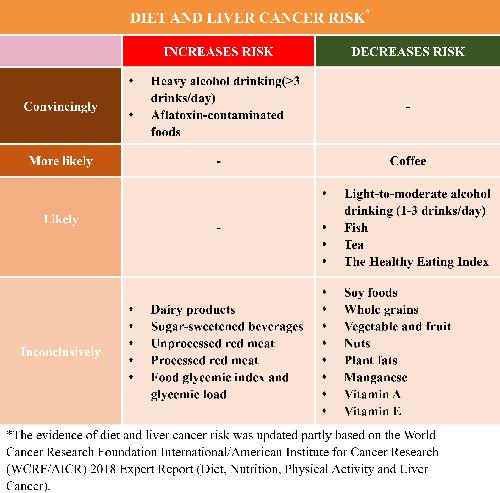British Journal of Nutrition ( IF 3.0 ) Pub Date : 2020-04-01 , DOI: 10.1017/s0007114520001208 Wan-Shui Yang , Xu-Fen Zeng , Zhi-Ning Liu , Qi-Hong Zhao , Yu-Ting Tan , Jing Gao , Hong-Lan Li , Yong-Bing Xiang

|
Primary liver cancer is the third leading cause of cancer-related death worldwide. Most patients are diagnosed at late stages with poor prognosis; thus, identification of modifiable risk factors for primary prevention of liver cancer is urgently needed. The well-established risk factors of liver cancer include chronic infection with hepatitis B virus (HBV) or hepatitis C virus (HCV), heavy alcohol consumption, metabolic diseases such as obesity and diabetes, and aflatoxin exposure. However, a large proportion of cancer cases worldwide cannot be explained by current known risk factors. Dietary factors have been suspected as important, but dietary aetiology of liver cancer remains poorly understood. In this review, we summarised and evaluated the observational studies of diet including single nutrients, food and food groups, as well as dietary patterns with the risk of developing liver cancer. Although there are large knowledge gaps between diet and liver cancer risk, current epidemiological evidence supports an important role of diet in liver cancer development. For example, exposure to aflatoxin, heavy alcohol drinking and possibly dairy product (not including yogurt) intake increase, while intake of coffee, fish and tea, light-to-moderate alcohol drinking and several healthy dietary patterns (e.g. Alternative Healthy Eating Index) may decrease liver cancer risk. Future studies with large sample size and accurate diet measurement are warranted and need to consider issues such as the possible aetiological heterogeneity between liver cancer subtypes, the influence of chronic HBV or HCV infection, the high-risk populations (e.g. cirrhosis) and a potential interplay with host gut microbiota or genetic variations.
中文翻译:

饮食和肝癌的风险:流行病学证据的叙述性回顾
原发性肝癌是全球癌症相关死亡的第三大主要原因。大多数患者在晚期被诊断出预后差。因此,迫切需要确定可用于肝癌一级预防的可改变的危险因素。公认的肝癌危险因素包括慢性感染乙型肝炎病毒(HBV)或丙型肝炎病毒(HCV),大量饮酒,代谢性疾病(例如肥胖症和糖尿病)和黄曲霉毒素暴露。但是,全世界的大部分癌症病例无法用当前已知的危险因素来解释。人们怀疑饮食因素很重要,但对肝癌的饮食病因学知之甚少。在这篇评论中,我们总结并评估了饮食的观察性研究,包括单一营养素,食物和食物组,以及可能发展为肝癌的饮食方式。尽管饮食与肝癌风险之间存在巨大的知识鸿沟,但当前的流行病学证据支持饮食在肝癌发展中的重要作用。例如,黄曲霉毒素,重度饮酒和可能的乳制品(不包括酸奶)的摄入量增加,而咖啡,鱼和茶的摄入量,轻度至中度饮酒和几种健康的饮食习惯(例如,替代健康饮食指数)可能会降低肝癌的风险。未来需要进行大量样本研究并进行准确的饮食计量研究,因此有必要考虑诸如肝癌亚型之间可能的病因异质性,慢性HBV或HCV感染的影响,高危人群(例如











































 京公网安备 11010802027423号
京公网安备 11010802027423号